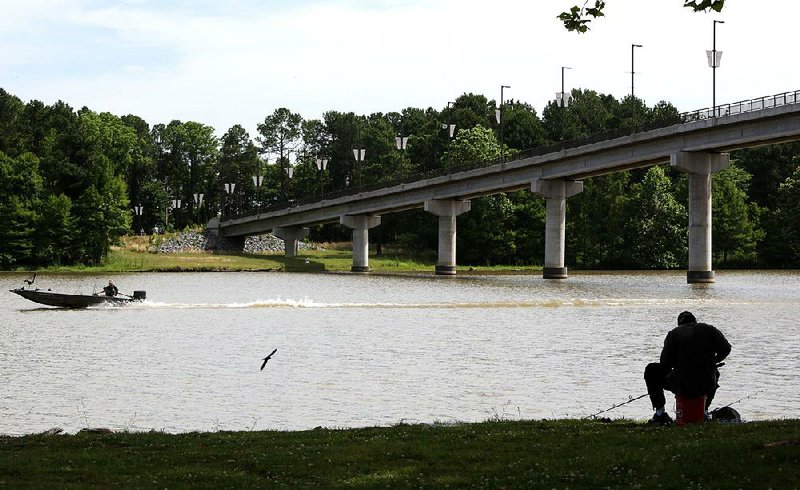A 20-year dispute over who owns a key piece of a popular public Pulaski County park is ready to be settled by a judge, say the warring parties, almost four years after their last court appearance.
At stake is a 45-acre section of Two Rivers Park where its landmark lighted pedestrian and biking bridge connects the Arkansas River Trail to the park at the confluence of the Arkansas and Little Maumelle rivers.
The $5.3 million, 1,368-foot bridge will commemorate its fifth anniversary in July, although the 1,000-acre park, a partnership of the city of Little Rock and Pulaski County, began development in 1992.
The park's roots date back more than 40 years to when the city condemned about 500 acres for parkland. The other half of the park's acreage came from the county.
The city's property takeover was challenged in court, eventually reaching the state Supreme Court, which sided with Little Rock's ownership claim in 1976.
But a joint venture, Blackwood's Island J.V., formed to represent property owners who say they are the true owners of the disputed land. It sued the city and county in 2012, challenging the city's condemnation claim as faulty.
The property owners asked Circuit Judge Chris Piazza to confirm their ownership and void the city's condemnation. The plaintiffs also want the judge to award them damages for trespass and force the two governments to pay their legal expenses.
Both sides recently asked the judge to set a date to hear their arguments.
At their last hearing, in July 2012, Piazza told the sides that he found merit in the arguments by lawyers for the city and county that the lawsuit should be dismissed, but that they did not have sufficient proof.
Attorneys argued then that the lawsuit should be rejected because the plaintiffs' claims have expired under the statute of limitations and mischaracterize the nature of the property in question.
The Blackwood's group is comprised of Michael D. Wilkins, who has claimed to own a piece of the property since 1996, and the Moore-Broadway LLC real estate company headed by real estate broker John A. Ryles and attorney Stephen Whitwell, which purchased a 40.7-acre tract from Wilkins in 2009.
The Two Rivers Bridge project trespasses on that tract, they claim.
The Blackwood's group, in a petition for the judge to rule in their favor, argues that they are entitled to at least a judgment that they own that 40.7-acre portion because they can trace their ownership of that section through a series of sales back to 1820.
Blackwood's takes its name from the 1915 buyer of an Arkansas River island, part of the land at issue, who paid $50 for it, court files show.
The government's ownership claim can only be dated to 1915, and when the city condemned the property in 1974, officials failed to seek out and notify any of the parties with a potential pre-1915 financial claim on the land, court filings show.
Furthermore, Blackwood's can also show that it and its predecessor owners have been paying property tax on the land since 1901, the group's filing states.
The plaintiffs argue that those factors should be enough for the judge to find in favor of the Blackwood's group on the large tract and rule that the 1974 condemnation and a 1915 court ruling purporting to confirm the city's ownership should be voided.
The city, which has never recognized Wilkins' ownership claims, counters that the judge should rule in its favor and dismiss the case because no land records substantiate the unbroken chain of property sales that Blackwood's argues legitimizes its interest in the land.
The property was forfeited to the state for nonpayment of taxes in 1941, the city states in its motion describing its proof of ownership. The proof is indisputable, in part, because it relies on evidence submitted by Blackwood, the city's motion states.
The city asserts that Wilkins' ownership claim is void because it stems from a land sale in 1988 that involved a previous property owner selling a tract she actually didn't own.
That wrongful sale was mistakenly recognized by the county assessor's office in 1999 when it relied on Wilkins' land survey to change the legal description of his property holdings, city attorneys argue.
Metro on 05/31/2016


